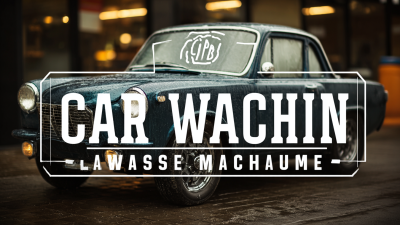Understanding the Different Types of Car Wash Machines: A Comprehensive Guide
The car wash industry has experienced significant growth over the past decade, with a projected market size of USD 38.1 billion by 2025, according to a report by Grand View Research. As consumers increasingly prioritize convenience and vehicle maintenance, the demand for efficient and innovative car wash machines is rising. These machines not only enhance the cleaning process but also minimize water usage and improve environmental sustainability. Understanding the different types of car wash machines available—ranging from touchless systems to automated tunnel washes—equips operators and consumers alike with the knowledge needed to choose the right solution for their needs. This comprehensive guide aims to explore the various types of car wash machines, their unique features, and benefits, paving the way for informed decisions in this booming industry.

Types of Car Wash Machines: An Overview of Options Available
When it comes to keeping your vehicle clean and shiny, understanding the various types of car wash machines available can help you make the right choice. The most common options include touchless car washes, which utilize high-pressure water jets and powerful detergents to remove dirt without any physical contact. This method minimizes the risk of scratches on the car's paint and is particularly advantageous for those looking to preserve their vehicle's finish.
Another popular option is the conveyor car wash, where vehicles are guided through a series of wash stations on a moving conveyor belt. These systems often include soft foam brushes and various rinse cycles, providing a thorough clean in a fraction of the time. Additionally, self-service car washes allow vehicle owners to wash their cars at their own pace, equipped with pressure wands, soap dispensers, and vacuums for added convenience. Each of these options caters to different needs and preferences, ensuring that every car owner can find a suitable solution for maintaining their vehicle's appearance.
Understanding the Different Types of Car Wash Machines
This bar chart illustrates the various types of car wash machines available in the market and their popularity based on usage frequency.
Touchless Car Wash Systems: Benefits and Considerations
In recent years, touchless car wash systems have gained immense popularity due to their efficiency and ability to preserve a vehicle’s finish. These systems utilize high-pressure water jets and specialized detergents to clean the surface of a car without any physical contact. According to a report by the International Car Wash Association, over 60% of car owners now prefer touchless services due to concerns about scratches and paint damage often associated with traditional methods.
When opting for a touchless car wash, it’s essential to consider both its benefits and limitations. On the plus side, these systems are excellent for removing dirt and grime while being gentle on your car’s paint. However, they may not eliminate tougher stains or road tar as effectively as touch-based washes. A study published in the Journal of Automotive Cleaning Technology highlighted that while touchless systems can achieve a clean finish, residual contaminants may remain without physical scrubbing.
**Tips:**
1. For optimal results, consider pre-treating your vehicle's surface with a spray that targets tough stains before entering a touchless wash.
2. It's advisable to regularly maintain your vehicle’s finish with wax or sealants, as this can enhance the effectiveness of touchless washes and protect your paint over time.
3. Always check the water pressure settings and detergent quality of the car wash to ensure a thorough cleaning experience.

Brush-Based Car Wash Machines: Performance and Maintenance Insights
Brush-based car wash machines are a popular choice for many commercial car wash operations due to their effectiveness in removing dirt and grime from vehicles. According to a report by IBISWorld, the car wash industry is expected to grow at a compound annual growth rate (CAGR) of 3.2% from 2021 to 2026, with brush-based systems leading the way in this expansion. These machines utilize rotating brushes made from various materials, including microfiber and foam, to gently scrub the surface of a vehicle, ensuring a thorough clean without damaging the paint.
Maintenance of brush-based car wash machines is critical to their performance and longevity. The International Carwash Association emphasizes the importance of regular inspections and cleaning of the brushes, which can accumulate dirt and debris over time. A well-maintained brush system not only enhances cleaning efficiency but also minimizes the risk of surface scratches, which can occur if debris gets trapped in worn-out brushes. Reports indicate that properly maintaining these machines can extend their lifespan by up to 30%, making it an essential aspect for operators looking to maximize their investment in car wash technology.

Conveyorized Car Wash Solutions: Efficiency and Convenience Explained
Conveyorized car wash solutions represent a significant advancement in the automotive cleaning industry, combining efficiency with convenience for both customers and service providers. These systems utilize a continuous conveyor belt that moves vehicles through a series of cleaning stages, significantly reducing the time taken to wash a car compared to traditional methods. With automated features, customers can simply drive their vehicles onto the conveyor, sit back, and relax while the car wash machine handles the job.
Moreover, conveyorized car wash systems are designed to accommodate various types of vehicles, from compact cars to larger SUVs. This flexibility allows operators to service a broader customer base and maximize throughput, making it an ideal choice for high-traffic locations. The integrated equipment often includes advanced wash technologies, such as foaming brushes and high-pressure rinsing, ensuring a thorough clean without compromising on quality. As a result, these systems not only enhance customer satisfaction by minimizing wait times but also optimize operational effectiveness for car wash businesses.
Self-Service Car Wash Stations: Flexibility and Cost-Effectiveness
Self-service car wash stations have gained popularity due to their flexibility and cost-effectiveness, making them an appealing option for both car owners and entrepreneurs. According to the International Carwash Association, self-service car washes can generate an average revenue of $25,000 to $50,000 annually, depending on location and usage. This affordability allows customers to pay only for the services they need, resulting in savings compared to full-service wash options, which can range from $15 to $30 or more per wash.
The convenience that self-service car wash stations provide cannot be overlooked. Many consumers appreciate having the option to wash their vehicles on demand, especially as they often operate 24/7. Industry studies suggest that approximately 90% of car owners prefer washing their vehicles themselves at least once a month, emphasizing the appeal of self-service locations. Additionally, with advancements in technology, modern self-service stations are equipped with high-quality equipment and eco-friendly washing solutions, which not only enhance the user experience but also minimize environmental impact. As the car wash industry continues to grow, self-service options remain a key player, meeting consumer demands for autonomy and budget-conscious solutions.
Related Posts
-

7 Essential Tips for Choosing the Best Car Wash Machine Equipment for Your Business
-

Ultimate Guide to Choosing the Best Automatic Home Car Wash System for Your Needs
-

How to Select the Best Self Car Wash Machine: Essential Tips for Global Buyers
-

Essential Guide to Choosing the Best Automatic Home Car Wash System for Your Needs
-

Global Success Story: China's Best Self Car Wash Equipment Redefines Quality Standards Worldwide
-

Maximizing After-Sales Support and Cost-Efficient Repairs: The Future of Business Car Wash Machines